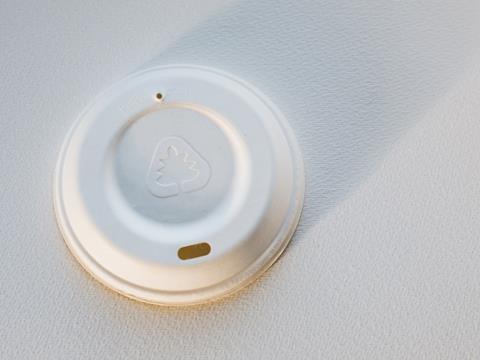
PulPac and HSMG have collaborated on water and oil barriers for PulPac’s Dry Molded Fiber technology that allows a thin, stretchable substrate to be applied during the forming process, helping to ensure the recyclability of moulded fibre packaging used for applications like coffee cups.
The companies explain that paper and moulded fibre packaging used for food contact applications traditionally incorporates a thin plastic film with the addition of fluorochemicals to prevent water and grease from leaking through. However, plastic layers can make paper-based packaging difficult to recycle, while fluorochemicals are increasingly being banned in some places due to their environmental and health impacts.
Therefore, PulPac and HSMG have developed water and oil barriers for the former’s Dry Moulded Fibre technology that apparently allows a thin, stretchable sheet of substrate applied with HSMG’s PROTĒAN solution to be layered onto the fibre mat as the article is formed. The companies say that the forming process bonds the HSMG carrier sheet to the product.
According to the companies, this process results in a strong, recyclable, and biodegradable alternative to single-use plastic that works even for hot drinks. The solution is reportedly non-fossil and plant-based.
Sweden’s MAX burgers will be the first company to use coffee lids made with PulPac’s Dry Molded Fiber and featuring the PROTĒAN barrier solution. The companies add that other Dry Molded Fiber applications such as hot beverage cup lids and take-away items will follow and be available for PulPac licensees.
Sebastian Roos, chief technology officer at PulPac, comments: “We are enthusiastic about the performance of the HSMG barrier technology platform. This solution is plant-based, plastic-free, biodegradable and recyclable, all important qualities to our customers and crucial for saving the planet from plastics.
“Our technology has pioneered fibre forming, making it possible to manufacture paper packaging without wasting valuable water resources or energy and significantly reducing CO2, at unit economy that is very competitive.
“We are fast approaching a tipping point where the single-use plastics items that can be replaced, will become obsolete in favour of competitive and truly sustainable alternatives.”
Jonathon Spender, chief technology officer at HSMG, adds: “PulPac’s Dry Molded Fiber technology is a good fit with HSMG’s barrier chemistry solutions. The PROTĒAN carrier sheet integrates readily into the manufacturing process and is an ideal way to target the barrier to the function required.
“We are thrilled that PROTĒAN technology will be available for licensing to PulPac customers.”
Last year, PulPac revealed the first-ever standardised production line for its Dry Molded Fiber technology. The company has since worked with Sandicore to launch paper tube lids made with PulPac’s technology, which are expected to reach consumers this Spring.














No comments yet